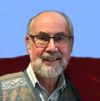Joseph Hart (1712-1768)
Joseph Hart was born in London 300 years ago. He became a pastor and hymn-writer, his most notable hymns being ‘Come ye sinners, poor and wretched’, ‘A Man there is, a real Man’, and ‘How good is the God we adore’.
Having parents who were Calvinistic Independents, ‘I imbibed’, says Hart, ‘the sound doctrines of the gospel from my infancy; nor was I without touches of heart, checks of conscience, and meltings of affections, by the secret striving of God’s Spirit with me while very young; but the impressions were not deep, nor the influences lasting’.
He was educated in the classics, loved literature and could be seen, head bowed, foraging among the dusty volumes of the bookstalls at Moorfields. Warm-hearted, but highly-strung, he was assiduous in his studies and went on to teach the classics, which he cherished.
Distress
In 1734, aged about 21, he began to have serious concerns about his soul. ‘The Spirit of bondage distressed me sore’. He tried fasting, mortification of fleshly lusts and strict attendance on religious ordinances to gain favour with God, but this was just a superficial reformation.
He resorted to taverns and theatres, and received the moniker ‘Mr Hearty’ from his drinking companions. After seven years, a severe domestic affliction led him to ‘sink deeper and deeper into conviction of my nature’s evil, the wickedness of my life, the shallowness of my Christianity and the blindness of my devotion’.
George Whitefield and John Wesley were now causing a stir in the country by their open air evangelistic preaching. Hart still called himself a Calvinist and would have heard Whitefield, who preached regularly at Moorfields from April 1738 until setting sail for America the following year.
In November 1739, Wesley preached in Bristol from Romans 8, declaring his belief in perfection in this life and universal redemption, and opposing the Calvinist position. This sermon was subsequently published in 1740 as Free grace.
It so affected Hart that, in 1741, he published The unreasonableness of religion. He argued that reason expects God to accept us on the basis of our good works, whereas religion teaches our acceptance is on the basis of the ‘righteousness of another, freely bestowed and given me, without the least regard to my own personal either merit or demerit’.
Antinomianism
But his views were distinctly antinomian. He said, ‘Having (as I imagined) obtained by Christ a liberty of sinning, I was resolved to make use of it, and thought the more I could sin without remorse, the greater hero I was in faith’. He later confessed: ‘I committed all uncleanness with greediness’.
Hart published scholarly translations from the Greek of classical authors Phocylides (1744) and Herodian (1749), yet his biographer Thomas Wright observes that during this period, ‘With all his erudition, the Bible was as yet a sealed book to him. He had still something to learn which mountains of Hebrew and oceans of Greek were incapable of imparting’.
The year 1751 marked some attempt ‘to reform a little and to live in a more sober and orderly manner’. Holding to the doctrines of free grace and justification by faith, Hart was confident in his good state with God.
In about 1752 he married Mary (1726-1790), who was probably the sister of John Hughes, a Baptist minister who eventually succeeded Hart in his pulpit.
Hart resumed reading the Scriptures, but saw no necessity for Christ’s death. In 1744, Whitefield preached at Plymouth. His preaching seriously affected Andrew Kinsman, who later became Hart’s most devoted friend. In 1754, Whitefield invited Kinsman to fill his pulpit at the London Tabernacle, where Hart’s parents heard him gladly and often invited him to their house.
Whitefield returned from America in 1755, and Joseph Hart became alarmed under his searching preaching and convicted of his sins. He became despondent that he had experienced no revelation from God.
Trust
Then, as he cried out to God in prayer, a voice seemed to say to him, ‘Do you choose the visionary revelations of which you have formed some wild idea, or to be content with trusting to the low, despised mystery of a crucified Man?’
Hart, with much comfort, made the latter choice. He was deterred from seeking fresh revelations by the verse which was impressed on his heart: ‘That which thou hast already, hold fast till I come’ (Revelation 2:25).
‘The week before Easter, 1757, I had such an amazing view of the agony of Christ in the garden, as I know not well how to describe. I was lost in wonder and adoration, and the impression it made was too deep, I believe, ever to be obliterated … It was upon this I made the first part of hymn 1, “On the Passion”.’
He was still not at peace: ‘The convictions I now laboured under were not like those legal convictions I had formerly felt, but far worse, horrible beyond expression. I looked upon myself as a gospel sinner; one that had trampled underfoot the blood of Jesus, and for whom there remained no more sacrifice for sin’.
He now keenly remembered the error of his antinomian ways and warned others, ‘For they who say, “Let us sin that grace may abound”, their damnation is just.’
He attended Moorfields and became personally acquainted with Whitefield. Finally, on Whit Sunday 1757, he was converted after hearing a sermon on Revelation 3:10, preached at the Moravian chapel in Fetter Lane, London.
Comfort
He records of this experience: ‘I was hardly got home when I felt myself melting away into a strange softness of affection, which made me fling myself on my knees before God. My horrors were immediately dispelled, and such light and comfort flowed into my heart as no words can paint.
‘The Lord, by his Spirit of love came not in a visionary manner into my brain, but with such divine power and energy into my soul that I was lost in blissful amazement’.
Hart records: ‘Tears ran in streams from my eyes. I threw my soul willingly into my Saviour’s hands; lay weeping at his feet, wholly resigned to his will, and only begging that I might, if he was graciously pleased to permit it, be of some service to his church and people’.
Later that year he wrote the hymn, A Man there is, a real Man. He published the first edition of his Hymns in 1759, listed in the order in which he wrote them. By 1825 there had been 23 editions, and many more since.
More trials were to follow. His eldest son was troubled with epileptic fits, and his son Daniel died aged just three in 1763. He penned this verse on God’s testing providences:
Gold in the furnace tried
Ne’er loses aught but dross;
So is the Christian purified
And better’d by the cross.
For those likewise afflicted, he prescribes prayer as the cure:
If pain afflict, or wrongs oppress;
If cares distract, or fears dismay;
If guilt deject; if sin distress;
The remedy’s before thee, Pray!
Hart strenuously defended the doctrines of grace in his preaching at the Jewin Street Chapel (Independent). And, if incapacitated through illness, ‘He made it his invariable rule’, said Augustus Toplady, ‘not to let an Arian, an Arminian, or any unsound preacher occupy his pulpit. His usual saying on those occasions was, “I will keep my pulpit as chaste as my bed”.’
Spirituality
Only one of his sermons remains. It is on Matthew 2:2, preached on Christmas morning 1767, and copied down in shorthand.
Sadly, all his letters apart from one to his nephew are lost. In this, he encourages his nephew to hold out to the end and be saved: ‘As to your fears of falling back again, they are no signs that you will fall, but rather the contrary; for none depart from God while they have any fears of departing from him’.
Early in 1768, Mrs Hart fell ill and remained an invalid. Joseph Hart was also in much pain. John Hughes later said to the congregation, ‘You are witnesses that he preached Christ to you, with the arrows of death sticking in him’.
In his last hours, he confessed, ‘I know myself to be a child of God, and an heir of glory’. He entered glory at his house in the Strand on 26 May 1768, aged 56.
His remains were interred at Bunhill Fields, along with those of John Bunyan, Daniel Defoe and John Owen. The funeral was attended by 20,000 mourners, with Kinsman giving the oration.
‘Hart’s hymns’, said a Mr H. Belcher, ‘are diamond fields. They sparkle with great thoughts. He is the most spiritual of the English hymn writers’.
Let us all remember in the midst of this world’s allurements, that, as Joseph Hart wrote, ‘None but Jesus can do helpless sinners good’.
Nigel Faithful






